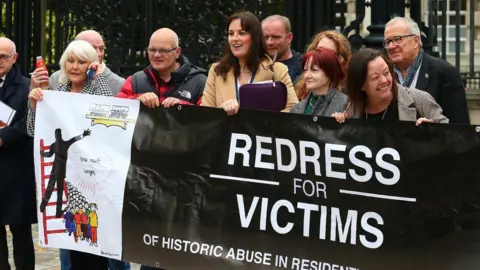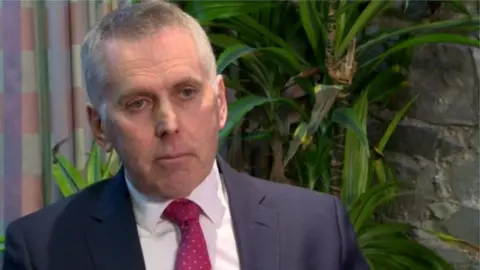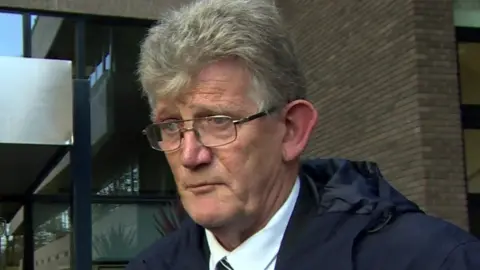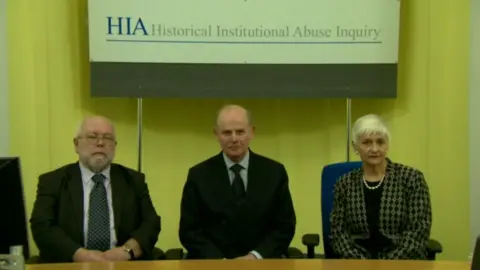Historical institutional abuse: Institutions told of compensation 'obligation'
 PAcemaker
PAcemakerThe head of the Northern Ireland Civil Service has contacted six institutions, including some religious orders, about compensation for victims of historical institutional child abuse.
In a letter, David Sterling said they all had an obligation to contribute to payments.
Mr Sterling said the civil service would "pursue" state-led institutions and churches over compensation.
Earlier this month, a long-delayed law was passed to allow state compensation.
The payment of compensation to victims and survivors of child abuse was recommended by the Historical Institutional Abuse (HIA) Inquiry nearly three years ago.
The inquiry investigated allegations of abuse at children's homes and residential institutions across Northern Ireland over a 73-year period.
The HIA compensation is being overseen by a newly-formed redress board.
Mr Sterling has made it clear that institutions found guilty of systematic failings by the HIA Inquiry, would be "reminded of their obligations".
This was to ensure that payments did not fall solely on taxpayers.

The six institutions Mr Sterling has written to are:
- Barnardos, which ran the Macedon Home in Newtownabbey
- The Sisters of Nazareth
- The Good Shepherd Sisters
- The De La Salle order
- Irish Church Missions
- The Sisters of St Louis
They have all been asked to identify a point of contact to oversee the redress payments.
'Sincere apology'
The Sisters of Nazareth have told BBC News NI they will "cooperate" with the redress scheme.
The order of nuns ran Nazareth House Children's Home and St Joseph's Home, Termonbacca, both in Londonderry.
In a statement on Friday evening, the sisters said: "It is right and proper that those who have been abused are compensated.
"We are glad that interim arrangements are now in hand and we will cooperate with the [redress] scheme as required.
"We repeat our sincere apology to those who were abused while in our care.
'Grossly unfair'
Jon McCourt, from campaign group Survivors North West, welcomed the news that the institutions had been asked to contribute.
"It's not right that the taxpayer has to carry the full burden of the redress process," he said.
Mr McCourt said that the compensation was due to be funded from Northern Ireland's block grant from Westminster, which funds public services such as health and education, and that would be "grossly unfair".
"We have had amazing support from the general public here in the north," he said.
"I would hate to think that, as a result of the financial contribution that makes up the redress fund coming off the top of the block grant, we would lose the goodwill of the people who have supported us."

He argued that money from the Treasury or Westminster should be made available to pay for the compensation because direct rule was in place during the period investigated by the HIA inquiry.
It is thought that 5,000 victims could be eligible for a payment, with the final figure running into tens of millions of pounds.
What is the compensation bill?
The compensation scheme was among the recommendations in the final report of the HIA Inquiry.
The public inquiry examined allegations of physical, emotional and sexual abuse of children in residential institutions in Northern Ireland between 1922 and 1995.
Chaired by the late Sir Anthony Hart, it investigated institutions run by religious, charitable and state organisations.

Sir Anthony recommended in his final report that all victims should receive tax free, lump sum payments ranging from £7,500 to £100,000 from a government-funded redress scheme.
However, the legislation stalled after the collapse of Stormont in January 2017.
Earlier this month, Appeal Court judges ruled that Stormont's Executive Office had the power to compensate survivors in Northern Ireland.
The following day, long-awaited legislation that will provide compensation for survivors was fast-tracked through Westminster, before Parliament was dissolved for the general election.
Northern Ireland Secretary of State Julian Smith described the bill as the first of its kind in the UK, in terms of how abuse survivors should receive recompense.
